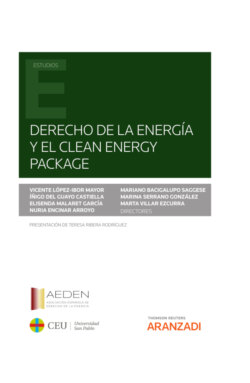Читать книгу Derecho de la energía y el clean energy package - Elisenda Malaret García - Страница 15
На сайте Литреса книга снята с продажи.
III. THE POLITICAL DECISIONS OF THE EUROPEAN COUNCIL IN THE PERIOD 2006-2014
ОглавлениеIt is implied that the evolution of the European energy policy that has just been described, was dictated by the political will of the European Council. It is worth mentioning, in this regard, the Brussels European Council of 23 and 24 March 2006 determined that the objectives of this energy policy must essentially be threefold: a) the security of supply in the EU, b) the competitiveness of the European economy and c) environmental sustainability.
The security of supply shall be ensured a) through a common external policy in support of energy policy objectives (dialogue with the producer and transit countries), b) ensuring common operational approaches to address crisis situations –in a spirit of solidarity (taking subsidiarity into account)– and finally, c) through the increasing diversification of sources of energy (national and imported), suppliers and transport routes. It is obvious that in this way, the Council aims to secure internal and external supply.
Competitiveness shall be ensured essentially a) by the complete opening of the internal market for electricity and natural gas (with an initial deadline of mid-2007), b) by promoting similar approaches in neighbouring countries, c) by accelerating the development of regional energy cooperation within the EU, d) by promoting storage installations, e) by coordinating the national energy regulators and f) by speeding up the administrative authorisation procedures to encourage investment.
Finally, environmental sustainability shall be promoted a) by energy saving (20% by 2020) and b) by developing renewable sources of energy (20% of the gross end consumption of energy within the EU by 2020).
To achieve the objectives of the European Union’s energy policy, the latter should, according to the European Council, respect the following four principles: a) avoid the discriminatory treatment of markets, b) apply the rules of competition, c) guarantee a public service and d) respect the Member States’ sovereignty over the primary energy sources and their sovereign right to decide what form of energy to use and in what proportion (“mix”). It is obvious that the first three principles constitute principles of European Union law that apply in all sectors of the economy and not just in that of energy. The fourth principle constitutes a principle of international economic law.
Subsequent European Councils confirmed this policy; they developed it more precisely while setting appropriate priorities but they also added to it and revised it. According to the conclusions of the European Council of 19/20 March 2009, energy infrastructures and interconnections must be developed, i.e. the Southern Gas Corridor, a diverse and adequate liquefied natural gas (LNG) supply for Europe, an effective interconnection of the Baltic region, the Mediterranean Energy Ring, an adequate North-South gas and electricity interconnection within Central and SE Europe and the North Sea and North West Offshore Grid. The European Council also recalled the need to make the best use of its own energy resources, including renewables, fossil fuels and, in countries which choose to do so, nuclear energy.
The decisions of the following European Councils of 4 February 2011, 9 December 2011, 22 May 2013, 20/21 March 2014 and 26/27 June 2014 are of central importance. In its conclusions of 4 February 2011, the European Council specified that safe, secure, sustainable and affordable energy contributing to European competitiveness remains a priority for Europe.
More particularly, with regard to the security of external supply, the European Council decided that the Member States are obliged, for better EU coordination in external relations, to inform the Commission on all (new and existing) agreements with third countries from 1 January 2012.
